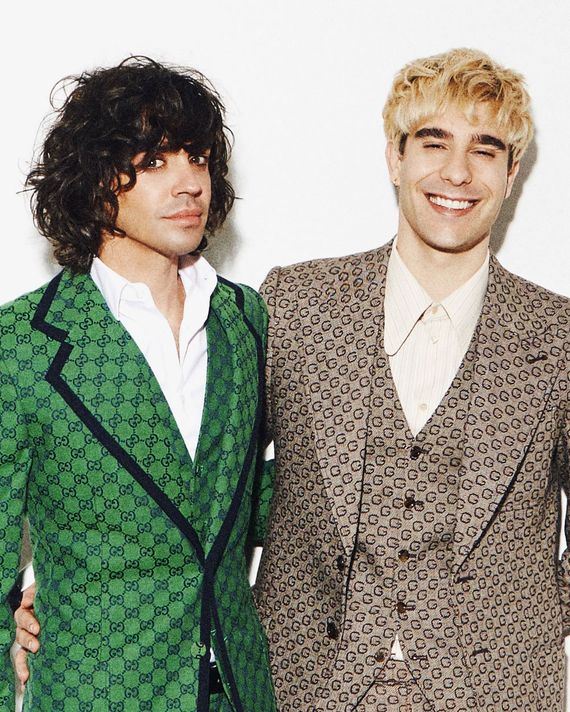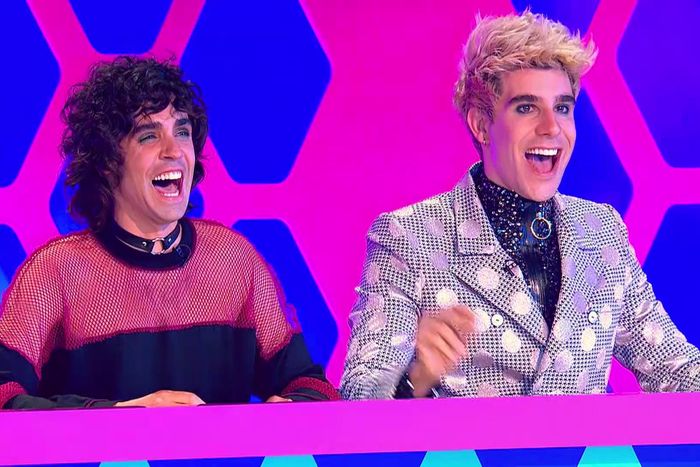
On paper, a show like Veneno reads like the kind of project often described as a risky proposition ÔÇö┬áa niche story destined to remain at the margins of mainstream fare. The Spanish series is an ambitious, decades-spanning ode to the life of the late trans icon Cristina ÔÇ£La VenenoÔÇØ Ortiz Rodr├¡guez, a sex worker who rose to fame in the late 1990s as a no-holds-barred guest on late-night television and became an infamous media personality, known as much for her revealing outfits as her prickly wit. Starring a formidable ensemble of trans actresses of all ages, this unabashedly queer drama is a celebration of Veneno, myth and woman alike, and a love letter to the community sheÔÇÖs come to represent.
But creators Javier Ambrossi and Javier Calvo, endearingly known as ÔÇ£Los Javis,ÔÇØ never approached Veneno as a niche endeavor. On the contrary, and in keeping with the work theyÔÇÖve been producing together for the better part of their decade as a couple, they dreamed up Veneno with the hopes of pushing back against such gatekeeping.
ÔÇ£I think when the industry talks about niche audiences ÔÇö that whole, Oh, this is only for a small number of people ÔÇö it has more to do with personal biases than actual numbers,ÔÇØ Ambrossi tells Vulture.
To that end, the runaway success of Veneno cannot be overstated. An award-winning ratings hit in Spain ÔÇö and a word-of-mouth phenomenon thatÔÇÖs found stateside fans in RuPaul, Mj Rodr├¡guez, and Janet Mock, among others ÔÇö the show also boasts a distinctly pandemic-era marker of popularity: When its first three episodes were released theatrically last year, they topped SpainÔÇÖs box office, dethroning Christopher NolanÔÇÖs Tenet in the process.
Such an accomplishment, which Ambrossi and Calvo share with gleeful pride as they take stock of their past year over Zoom, is but another tangible reminder of how far the two have come. Ambrossi thinks back, for instance, to those many bit roles he took as an aspiring actor in the early 2000s, a time when his childhood dreams of being a writer seemed like an impossibility. And while Calvo had more success ÔÇö especially with the groundbreaking role of Fer, an openly gay teen on the hit 2008 show F├¡sica o Qu├¡mica ÔÇö he, too, found that few opportunities followed. By the time they met and began dating in 2010, they decided to forgo the industry altogether and make their own content.
In the decade since, theyÔÇÖve grown alongside their ever-more-ambitious projects. Their cult hit musical La Llamada ÔÇö about two teenage girls at a Catholic summer camp, featuring a Whitney HoustonÔÇôbelting vision of God ÔÇö began its initial eight-night run in 2013 in Madrid and became an underground hit, spawning a 2017 Goya-nominated feature film, several international iterations, and a Spanish tour that recently restarted following a pandemic hiatus. Similarly, Paquita Salas, a 2016 indie web series the two created as a way to hone their filmmaking skills, soon turned its titular washed-up ÔÇÖ90s talent agent (played by Brays Efe in a killer wig and bold lip) into a meme-ready sensation. Netflix picked up the campy comedy and ordered three more seasons, including a fourth pending release.
Veneno is both the culmination of Ambrossi and CalvoÔÇÖs work thus far and a thrilling calling card for whatÔÇÖs to come. As the first major project under their new production company, Suma Latina Producciones, the series was an intentional step forward in terms of what kinds of stories the two hope to continue telling.
ÔÇ£What do we want to do now that weÔÇÖre in this position where we can do whatever we want?ÔÇØ Calvo remembers asking himself. ÔÇ£And we decided to do something important ÔÇö something that didnÔÇÖt just feed our ego, something that could give back to our community and that could be of service. And we knew that meant telling VenenoÔÇÖs story.ÔÇØ
But they didnÔÇÖt want to write a straight-up biopic, one that would follow familiar tropes and well-worn narrative beats. Taking inspiration from films as disparate as Casino, Goodfellas, and My Week with Marilyn, they opted for an approach that would fragment and filter the audienceÔÇÖs understanding of Cristina. Valeria Vegas, whoÔÇÖd written CristinaÔÇÖs memoir, ┬íDigo! Ni puta ni santa. Las memorias de La Veneno (Listen! Neither whore nor saint. The memories of La Veneno), served as the perfect character through which to structure the series. Veneno would become a hydralike narrative: As Valeria (Lola Rodr├¡guez) gets Cristina (Isabel Torres), now in self-imposed media exile following her 2006 prison release, to unearth her own stories for a college assignment that morphs into a full-blown manuscript, the audience witnesses VenenoÔÇÖs life perhaps not the way she lived it, but the way she tells it. The many flashbacks that make up the bulk of the show depict actresses Jedet and later Daniela Santiago inhabiting younger versions of Cristina during and after her transition in 1990s Madrid. TheyÔÇÖre juxtaposed with ValeriaÔÇÖs own transition under the guidance not only of Cristina, but the many trans women she meets through her.
By telling VenenoÔÇÖs story through ValeriaÔÇÖs eyes, Los Javis wield a bolder form of storytelling that plays with the blurred lines between fact and fiction. As Cristina looks back on her life as young Joselito in Arda, where her homophobic mother all but casts her out of their home, and reminisces about her early days walking the streets in MadridÔÇÖs Parque del Oeste, she finds herself borrowing from different genres, often aggrandizing her own achievements, making them more epic, more fabulous (and, for that, utterly beguiling) than they were.
For Los Javis, authenticity neednÔÇÖt be synonymous with veracity. CristinaÔÇÖs flights of fancy, her campy attitude, and her penchant for exaggeration remain central to her iconicity. It made sense to build the entire series around the way Cristina indulged in myth making to fight for her own survival. ÔÇ£We knew we could create anything,ÔÇØ Ambrossi adds. ÔÇ£We could stage a scene straight out of a superhero flick ÔÇö like when she bites off a [fellow sex workerÔÇÖs] nipple out in the rain ÔÇö because at the heart of it, we were anchored in truth.ÔÇØ
That truth was their North Star, the guiding principle that softened the weight of responsibility that came with bringing CristinaÔÇÖs life to the screen in what would undoubtedly be a pioneering series in Spanish television. Los Javis nurtured a collaborative spirit in their writers room (which included both Vegas and trans writer-director Ian de la Rosa) and on set (the cast included CristinaÔÇÖs real-life BFF Paca la Pira├▒a as herself, as well as more than a dozen trans and nonbinary performers), empowering everyone involved to bring their own truth to the material.
ÔÇ£This was going to be the first series in Spanish history starring trans actresses,ÔÇØ Ambrossi recalls. ÔÇ£We needed to do it justice. There was no way around it. And it was a lot. You know: write it well, direct it well. But then, also, we made sure that every department employed trans people. Every single one. WeÔÇÖre talking costumes, hair and makeup, our drivers, sound, lights, our camera crew, all of them. We knew this show had to look beautiful on the outside, but be real on the inside.ÔÇØ
As for a second season, Calvo is hopeful but measured: ÔÇ£If we were to do it┬áÔÇö and right now itÔÇÖs not on our plate just yet ÔÇö itÔÇÖd be because weÔÇÖve come to learn a lot about the world around Cristina; about 1980s Madrid and even before that, when we had a dictatorship here in Spain. ItÔÇÖd be about those pioneers from our community, who we know so little about still.ÔÇØ
ÔÇ£ItÔÇÖd be about continuing to write a love letter to the [Spanish] LGBT community,ÔÇØ Ambrossi clarifies. ÔÇ£ItÔÇÖd be a continuation of VenenoÔÇÖs philosophy more than its story.ÔÇØ
Audiences may have to wait a while, though, as Ambrossi and Calvo have a full slate of projects in the works already. They were signed by CAA just a few months into 2021, and theyÔÇÖre also gazing beyond the roles of writer-director to more public-facing work, dabbling in everything from reality television competitions to fashion lines. Embracing their roles as public figures is something the two now see as central to their own careers, even if itÔÇÖs taken them a while to warm up to such a proposition.
ÔÇ£ItÔÇÖs been hard, in a way,ÔÇØ Calvo notes. ÔÇ£Especially moving past our own prejudices. Because every time we said yes to any of these other projects, we kept telling ourselves that in the end we wanted to be seen first and foremost as serious filmmakers. But slowly we came to see that approach as a really outdated one.ÔÇØ
So they channeled one of their own creations: Paquita Salas. As the driven (if oftentimes hapless) talent agent tells her would-be clients, performers in the 21st century have to be ÔÇ£360.ÔÇØ ItÔÇÖs not enough to be a triple threat or handily shuttle between comedy and drama. ItÔÇÖs about understanding that being a public figure nowadays necessitates a well-rounded approach to oneÔÇÖs career. As she puts it, you never know if the director of that milk ad will be the next Alejandro Amen├íbar.
PaquitaÔÇÖs cheeky advice is the reason Los Javis worry less about boxing themselves in. Self-described workaholics, the two find the most joy in diving headfirst into an eclectic career brand that feels distinctly millennial. ÔÇ£WeÔÇÖre part of this DIY generation,ÔÇØ Calvo says, ÔÇ£and I think weÔÇÖve just learned to do all sorts of things from all kinds of different places. So why wouldnÔÇÖt we just tap into all of that?ÔÇØ
ÔÇ£I think with La Llamada, with Paquita Salas, and with Veneno, weÔÇÖve always focused on this ideal of freedom,ÔÇØ says Ambrossi. ÔÇ£WeÔÇÖve always been interested in exploring what it means to be true to yourself. And I wouldnÔÇÖt be comfortable writing about that without also staying true to that in my life. You canÔÇÖt just write it. You have to live by it. ThatÔÇÖs also why weÔÇÖre so open and public about our relationship.ÔÇØ
Three-quarters of the way through 2021, the two have already amassed an enviable tasting platter of projects that feel distinctly ÔÇ£Javis.ÔÇØ Calvo kicked off the year with a return to F├¡sica o Qu├¡mica for a reunion special, with an Ambrossi cameo to boot. The two followed it up with a return to SpainÔÇÖs The Masked Singer and the unveiling of Drag Race: Espa├▒a, which found the two having a ball as judges of the Spanish Ru spinoff. They scored plum appearances in the kickoff episode of the much-awaited variety show B.S.O., are hard at work as executive producers on the upcoming series Cardo, and even found time to launch the latest collection of their As If clothing brand. All while keeping addictively active social media accounts that chronicle AmbrossiÔÇÖs reading habits, CalvoÔÇÖs ever-changing hairstyles, adorable throwback pics, and plenty of gushing praise for one another ÔÇö a virtual extension of their joyful, campy oeuvre.
After a decade of working independently, at a moment when theyÔÇÖre on the brink of a global breakthrough, Los Javis feel emboldened to continue following their gut and paving their own wayward road forward. And with that, the ethos of their work remains as simple as ever: ÔÇ£No es para pocos, es para todos.ÔÇØ ItÔÇÖs not for the few, itÔÇÖs for them all.
This interview was conducted in Spanish and translated into English by the author.


